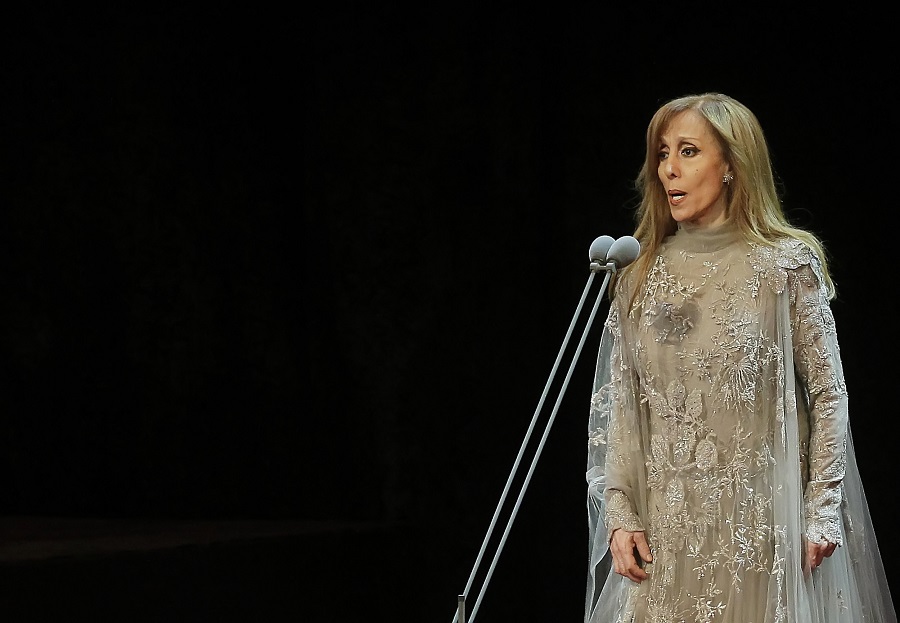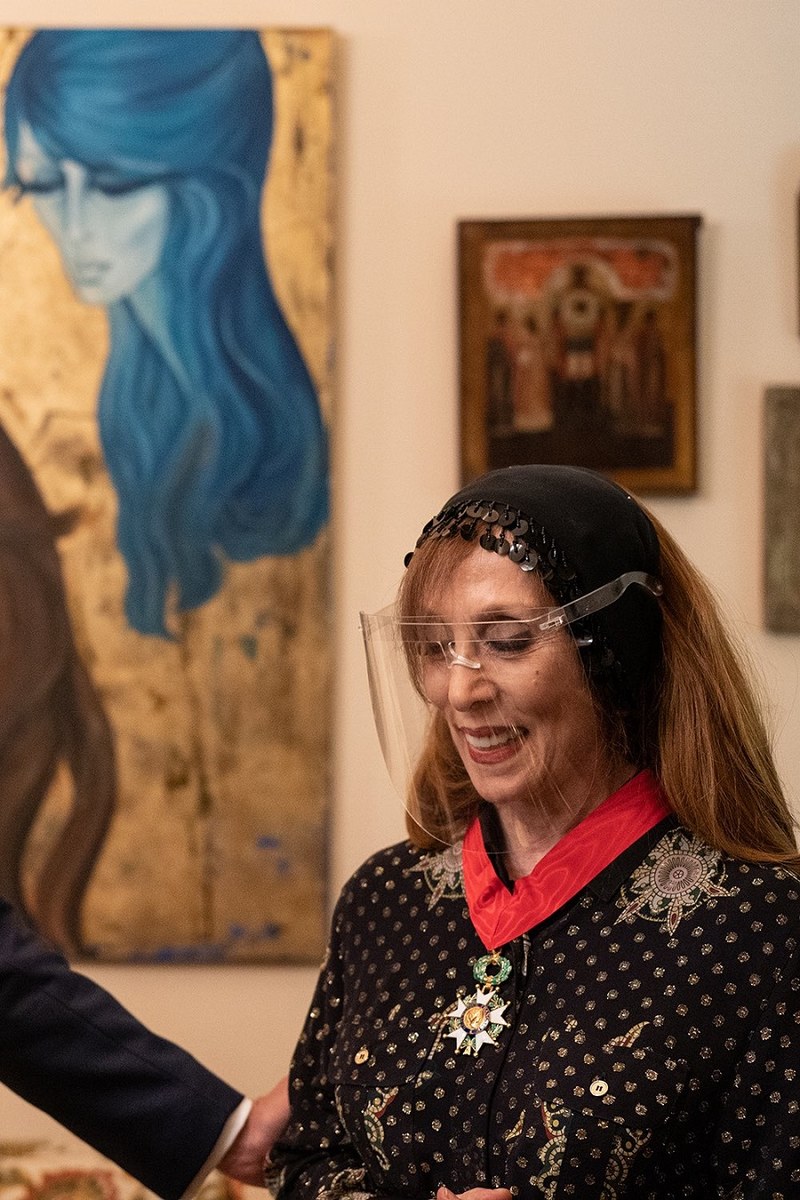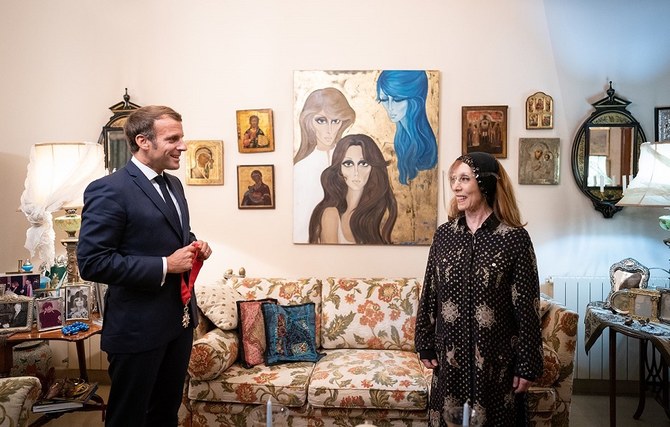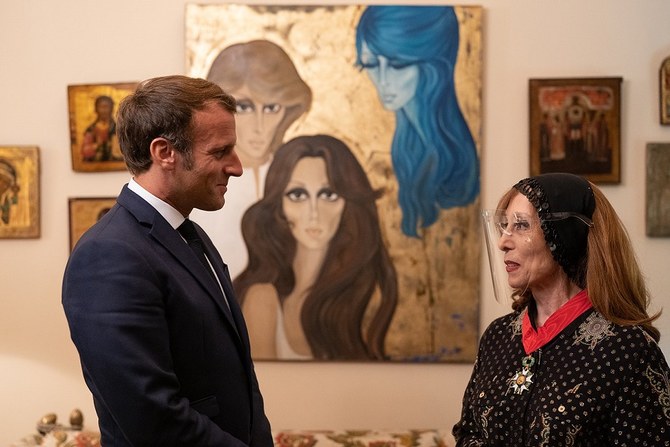BEIRUT: Who does not know Fairuz, Lebanon’s “ambassador to the stars?” Who in Lebanon has never heard one of Fairuz’s songs? The legend of the Arab world is in the limelight now but for a reason other than her music: French President Emmanuel Macron visited her at her home in Rabieh, north of Beirut, on Tuesday when he arrived in the Lebanese capital for the second time in a span of weeks.
It came as no big surprise that Macron chose to meet Lebanon’s No. 1 diva instead of its feuding politicians or civil society activists. Many Lebanese still start their day listening to Fairuz’s songs and see her as one of the rare figures beloved across the political spectrum, a symbol of unity in a culturally rich and refined country now riven by disagreements.
Starting in the 1950s, Fairuz made her way, alongside the Rahbani brothers, Mansour and Assi (her husband), into every Lebanese household to sing for love, freedom and peace. Generations fell in love listening to her songs. The Lebanese people made it through the war with her patriotic tunes that were never too far away.

Fairuz’s wide repertory covers almost 3,000 songs, three movies and about 20 musicals. (Supplied)
Fairuz was born in 1934 with the birth name of Nouhad Haddad. Her family had settled in Beirut’s Zoukak El-Blat district. She took the first step of her career in 1947 by joining the choir of Radio Beirut.
Bowled over by her voice, the radio’s director, Halim El-Roumi, gave her the nickname Fairuz (Arabic for emerald) and hired her. That was where she met the Rahbani brothers. While married to Assi, she gave birth to four children: Ziad, Rima, Layal and Haali.
Together, they revolutionized Lebanese folk and popular songs, making Fairuz, along with Egypt’s Oum Kalthoum, the most famous voice of the Arab world.
Fairuz’s wide repertory covers almost 3,000 songs, three movies and about 20 musicals. Her career took off after her first concerts during the Baalbeck International Festival, where “she shook the columns of the Roman temples,” in the words of the former French culture minister, Jack Lang.
Despite being internationally renowned, Fairuz was little known by the general public. She voluntarily maintains this aura mystery, rarely giving interviews to the press. “Catherine Deneuve used to say that to be a star, one should always keep a bit of a mystery,” said Georges Bechara, a person close to Fairuz and who is passionate about her and her art.
“She does that by not being always accessible, which adds weight and sparkle to her presence. She does not take over television screens and magazine pages. The public adores her for her discretion and simplicity.”
Fairuz the artist is as complex as Nouhad the person. During her concerts, she adopts a fixed and cold posture. However, other versions of Fairuz exist: the cheerful, the mischievous and the joker. “In their operettas, the Rahbani brothers have often created characters similar to Fairuz such as Loulou, Zayoun and Qronfol,” said Bechara.
“Assi was able to perfectly understand the true character of his wife in order to create roles that resembled her. Fairuz was his muse and his son, Ziad, got his sense of humor from his mother not his father.”
Georges believes that Fairuz expresses herself through her songs without needing to expose herself to the media. “She has sung about love, life, death, the homeland, prayer, God … .The social side does not interest her.”
Since the beginning of her career, especially during the Lebanese war, Fairuz chose to remain discreet about her political opinions, in contrast to a lot of artists who were politically involved. “Fairuz sings for Lebanon. She never wanted to be with one party against another or support a politician against another,” said Bechara.
Throughout her songs, the Lebanese diva sings for peace and love. Whether you are a Christian or a Muslim, a Sunni or a Shiite, Moroccan or Iraqi, her voice reaches the depths of your being, transcending conflicts and identities.
In 2008, she caused controversy when she performed in Damascus while Lebanon was plunged into a deep political polarization between the two political camps of “March 8” (pro-Syrian regime) and “March 14” (anti-Syrian regime). She remains a national symbol that transcends political and generational divisions.
“Her character in private resembles that of our mothers,” said a person close to her “When she has visitors, she serves coffee and offers sweets and chocolates. She insists just like our mothers. She acts like any other woman at home, with the same Lebanese habits of generosity and hospitality.”
In public, however, Fairuz is withdrawn and very shy. She always has stage fright before shows. This is also why she avoids contact with the public and the press.
Another reason for this aloofness is Fairuz’s deep commitment to her private life, which has been filled with sorrow and torment. There is a dissociation between Fairuz and Nouhad. As a mother, the singer has been through a lot of hardships. Very few people know her deep wounds and daily battles.
Fairuz personally cares for her son Haali, who is disabled from birth, a situation that has never been easy for her. In 1978, her marriage with Assi ended along with their vibrant artistic collaboration. Her daughter, Layal, died in 1987 from a cerebral hemorrhage.
Since 1979, her son, Ziad, has been composing her songs, introducing a new style for the diva that the audience was not accustomed to. This sparked a debate between those nostalgic for the romantic and popular songs of the Rahbani brothers and those adoring Ziad’s jazz-infused and more eclectic songs.

Over the years, Fairuz has received a number of French distinctions and held several concerts in Paris. (Supplied)
The relationship between Fairuz and the Rahbani brothers has always been the focus of much speculation. We still wonder who created whom? Was Fairuz the one who catapulted the brothers to fame? Or were the Rahbani brothers the ones who thrust Fairuz into the spotlight?
“She allowed the gifts of the Rahbani brothers to be interpreted. This is what we call the genius of the voice,” said Bechara. “Obviously, the lyrics and music of Mansour and Assi were exceptional. However, we must also admit that the sensitivity and the voice of Fairuz made it possible for the art of the Rahbani brothers to be consecrated. In fact, her son Ziad explained this. His mother often added her personal touch. Her voice created music. This is the power of Fairuz.”
Fairuz has generally had troubled relations with political leaders. She has always refused to hold a private concert for any head of state. “During the government of Charles Helou, the Tunisian President Habib Bourguiba visited Beirut in 1965,” said Bechara. “At the time, the Lebanese authorities asked Fairuz if she could hold a public concert at the Casino du Liban in honor of Bourguiba, a huge fan of the Lebanese diva.”
During the rehearsal, Bechara recalls, the Lebanese authorities asked the singer if she could go to the presidential palace for a private recital in the presence of the two presidents for security reasons. “Fairuz flatly refused to perform at the palace and the concert was canceled,” he said. “As punishment, the diva’s songs were banned from the Lebanese public radio. Fairuz eventually performed in Tunis, where Bourguiba finally got the chance to attend her concert.”
In 1976, during the Arab Summit in Cairo, as Fairuz prepared for a concert at the theater of “Andalusian Garden” (Hadikat Al-Andalos), Bechara said, “the Lebanese delegation, headed at the time by President Elias Sarkis, urged the singer to perform for the Arab heads of state at the presidential palace of Anwar Sadat. She categorically refused.”
“Fairuz repeatedly said that the best tribute she would like to receive during her life is having a theater named after her. President-elect Bachir Gemayel had promised her that. However, he was assassinated,” Bechara said.
Over the years, Fairuz has received a number of French distinctions and held several concerts in Paris. In 1988, President Francois Mitterrand made her a “Commander of the French Order of Arts and Letters,” while President Jacques Chirac bestowed on her the “Knight of the Legion of Honor” title in 1998. It is now President Macron’s turn to honor her, which he has done with a visit to her home.






























